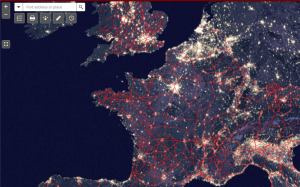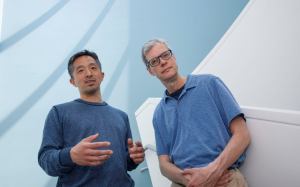Zittrain speculates on Web’s trajectory
At 10th anniversary of Berkman Center, a look at short past of Internet, and worries about its future
Jonathan Zittrain is a man with a passion for cyberspace and a concern for its future.
His dynamic style, energy, and command of all things cyber-related were evident Thursday (May 15) as he opened a two-day conference at Harvard Law School (HLS) to commemorate the 10th anniversary of the founding of the Berkman Center for Internet & Society.
The center, which Zittrain, Jack N. and Lillian R. Berkman Visiting Professor for Entrepreneurial Legal Studies, helped establish during the heart of the dotcom boom, was created, says its Web site, “to explore and understand cyberspace; to study its development, dynamics, norms and standards; and to assess the need or lack thereof for laws and sanctions.”
Zittrain’s opening talk, “The Future of the Internet (Take 1),” drew from his book “The Future of the Internet — And How to Stop It” (Yale University Press, 2008) and described both positive and negative aspects of the Internet. The talk noted the collaborative, open nature of the Web and included suggestions about how to combat threats to these qualities — qualities that make the Internet so fruitful and dangerous at the same time.
In conjunction with the conference, HLS Dean Elena Kagan announced on behalf of the University that the Berkman Center has expanded to become a University-wide, interfaculty initiative. The move, Kagan said, will expand the center’s reach to include disciplines from across the University.
“It will be reaching out even more than in the past to draw upon faculty and students and other parts of the University and beyond to extend the great work that it has under way,” she said.
The center’s varied initiatives include the Internet and Democracy Project, which explores how the Internet affects democratic norms and methods; the OpenNet Initiative, a collaboration among the University of Toronto, the University of Cambridge, the University of Oxford, and HLS that studies and reports on Internet filtering, surveillance, and censorship by states around the world; and the Internet Law Program that educates the public about cyberlaw issues.
But the future may not be all that bright for the worldwide system of computer networks that exchange information, according to Zittrain, the center’s faculty co-director. The very founding principle of the Internet’s communication process — the notion of openly sharing information and technology and connecting with one another in good faith — is in danger of being replaced by more restrictive measures.
If the job of policing the Internet to protect users from potentially destructive computer code and electronic spam falls to the government, Zittrain worried, it could introduce something similar to a cyberversion of the Patriot Act and severely hinder the Web’s open nature. In addition, noted Zittrain, the move toward personalized, high-tech devices, such as cell phones and personal digital assistants that arrive fully programmed, has meant a move away from users sharing computer applications and toward individual companies controlling and regulating software distribution.
“It leads back to a world that we thought we had left behind,” said Zittrain.
In large part the fundamental, shared-value nature of the Internet is what makes it special, quirky, and unique, said Zittrain. It’s one that at times “relies on a social understanding [underneath] the technology that says you won’t listen in on other people’s communications.”
He offered hope with the story of the “Star Wars Kid,” and the notion of Internet users sharing information and opinions while employing an understood social code to respect a person’s privacy.
The “Star Wars Kid” is a Canadian teen who unwittingly became an Internet sensation when the video he produced re-enacting a light saber scene from the George Lucas film with the help of a golf ball retriever was uploaded by his friends and became a smash hit. The teen, who had no intention making the video public, needed counseling to deal with the unwanted attention.
The information about the teen was posted on Wikipedia, the free, open content, online encyclopedia that anyone can edit, and a discussion among its users ensued about whether to use his name in the post. While one user felt it was important to include the information, others noted that the parents of the child had requested that it not be included. “The kid really got hurt by this,” one person wrote, Zittrain said, adding, “If he were your kid, you would do the same.”
“This is about ethics,” said Zittrain, “and that argument [not to include the teen’s name] prevailed.”
Zittrain said the Internet could survive and flourish by relying on things like due process and an opportunity to be heard when problems arise.
With issues like privacy rights, he argued, there needs to be “a way of expressing social preferences and having people elsewhere on the Net make a choice about whether to respect them.”
It’s a matter of how to “balance the needs of the people whose behavior maybe ought to change,” said Zittrain, “with people, who in the absence of that behavioral change, run into trouble.”




